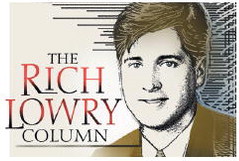The Musk Factor


It’s a testament to the energy and drive of Elon Musk that he’s now a key adviser to an incoming president of the United States who he helped elect this year – and this is a side project for him. What stamp collecting is to most of us – something we make time for when not en- gaged in our day jobs – influ encing the future direction of the United States government is to Musk.
This is not to minimize his significance. Far from it. The revolutionary businessman represents a distinctive and unexpected contribution to the Trump coalition.
From the perspective of a decade ago, if you had said the most visionary and wealthy entrepreneur on the planet was at the right hand of a Republican president-elect, promising to cut a couple of trillion dollars from the federal budget and bring massive innovation to the economy, you might have assumed Paul Ryan or someone in his ideological camp had gotten elected.
The former Speaker of the House and vice-presidential nominee was a relentless advocate of entrepreneurship, economic dynamism and a slimmed-down government.
Within the GOP, the rise of Trump the populist put the political squeeze on the likes of Ryan, whose business-oriented, free-market creed suddenly felt stale and out of touch.
Now, a version of that worldview has returned via Musk.
To be sure, the CEO of Tesla and SpaceX is a different animal. He has an in-your-face persona, a bit of a Silicon Valley version of Trump. He’s been radicalized on immigration, becoming a fierce opponent of Joe Biden’s open border. He’s a cultural warrior seeking to destroy what he calls “the woke mind virus.” And he can speak in apocalyptic tones.
All of this, and especially his acquisition of Twitter, has made him a populist hero in his own right, even as he champions an economic dynamism that would have thrilled conventional Republicans from the pre-Trump era.
Trump contains multitudes. Part of him is an inwardlooking protectionist who believes, almost no matter what, that we are getting ripped off by foreign countries. Part of him is also a champion of endless possibility. Part of him is a tribune of the working class. Part of him is also inclined to make the stock market the economic measures of all things. He’ll talk of American carnage, and of an American golden age.
This is a protean mix, and subject to change depending on circumstances and who is around Trump at any given point.
A danger of populism is that it can succumb to pure nostalgia and become overly defensive, giving in to a distrust of technology, big companies and economic change. So long as Musk is a major player in Trump’s world, there is a strong counter to this tendency.
Musk is the paladin of a future ripped from the covers of paperback science-fiction novels circa the 1950s – rocket ships, futuristic cars, robots and giant tunnel-boring machines.
He has almost singlehandedly changed Republican attitudes toward Big Tech. He’s proven that you can be a Silicon Valley entrepreneur and not be woke or a cowardly fellow traveler with left-wing politics. There’s still plenty of contempt of and distrust for tech companies on the Right, but now it is Democrats who talk more of ideas like repealing Section 230 to hobble social- media companies.
At the same time, Musk’s continued from page
Department of Government Efficiency has made seeking to cut government fashionable again on the Right, when this priority had mostly lost out to other concerns since the advent of the Trump era. The hope that DOGE will cut as much as $2 trillion from the budget is unrealistic, but any savings and efficiencies would be welcome.
Who knows how effective Musk will be in his role as a change agent confronting government, the most difficult institution to change? Sending a man to Mars might be easier. But Musk brings a boundless optimism and can-do verve to the effort, and he’s a healthy new ingredient to Trump’s populist mix.
Rich Lowry is editor of the National Review.
Synd., Inc.





out of
Posted on